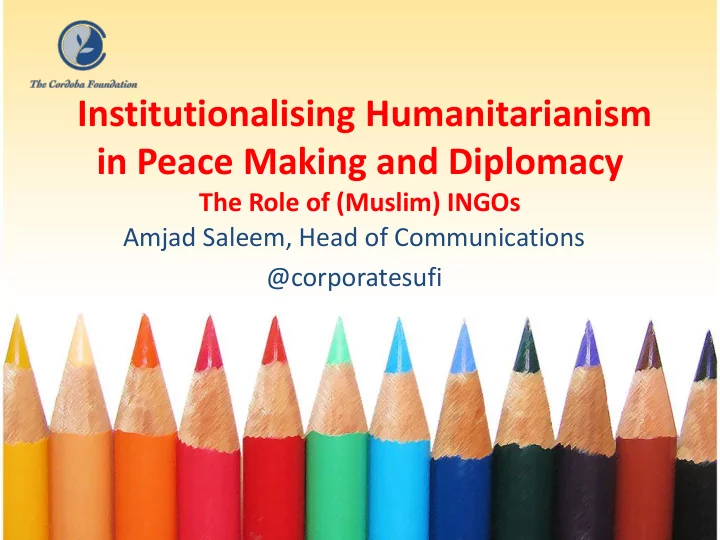

Institutionalising Humanitarianism in Peace Making and Diplomacy The Role of (Muslim) INGOs Amjad Saleem, Head of Communications @corporatesufi
Context • A 60% increase in the number of humanitarian crises/complex political emergencies over the last 10 years in comparison to the previous decade • Humanitarian disasters will continue to occur with greater frequency and with greater ferocity; (Source: speech by Gareth Thomas MP, Minister of State for International Development to the Executive Committee of the United Nations High Commission for Refugees, 7 October 2008).
UK (Charity Commission) • 1,373 Muslim charities on central register (combined income of £218.5 million) • 2% of registered Muslim charities have an income of over £1m • 379 Muslim charities have registered in last 5 years • Largest is Islamic Relief Worldwide
Estimate of Aid Contributions Every year, somewhere between US$200 billion and $1 trillion are spent in "mandatory" alms and voluntary charity across the Muslim world, Islamic financial analysts estimate. (IRIN, June 2012) At the low end of the estimate, this is 15 times more than global humanitarian aid contributions in 2011 of $13 billion (UN Financial Tracking System)
Why? • Increasing religiosity in the Muslim world • Increasing wealth in the Muslim world • Increasing poverty in the Muslim world – ¼ of the Muslim world living on less than $.125 a day (calculated by IRIN based on 2011 HDI) • Decreasing aid from traditional western donors due to recession • Increasing awareness from 2 nd / 3 rd generation Muslim communities about poverty etc
Challenges & Opportunities
Disconnect • Lack of understanding of the concept of poverty / development – Ineffective – Lack of strategy for sustainable development – Mismanagement – Wasted • Working around conflict • Lack of proper understanding of Islamic faith teachings on development • Struggle for support for ‘intangible’ causes • Competition vs Ideology
Organisation Myopia 1. Understanding of Mission 2. Religious Charity Mentality (?) 3. Clarity of Issues
Confusion of Purpose of Existence 1. Legitimacy 2. Mission 3. Secular vs Faith 4. Symbiosis 5. ‘right’ operating model
Security • Counter-terrorism laws & other measures are having a significant impact on humanitarian action. (HPG, 2011) • Linked to fundraising & disbursement • Conditional humanitarian funding from donor governments • Challenges for Peace-Building
Opportunities • Continuous charity • Comparative advantage – cultural competency and moral authority • Buffer? • First responders in emergencies – footprints on the ground • Better understanding of theoretical framework for development and peace building from an Islamic perspective
Conflict & Humanitarianism Inequality & Injustice Emergency ( Disaster & Human Displacement ) Human Conflict Poverty Inadequate Preparation Natural Forces
Way Forward
New Paradigm 1 • Development without Peace is unsustainable • Peace building without Development is ineffective • Explicitly integrate peace-building goals, systems and processes within and across all tracks – Track 1, 1.5, 2, 3
New Paradigm 2 • Better understanding of terminologies & concepts – Link issues with development, humanitarianism – Better mechanisms for distribution & management • Engaging in advocacy • Using existing channels more effectively • Better regulation • Better programming and coordination
New Paradigm 3 • Capacity Building & Literacy • Better dialogue • Networks and partnerships • Invest on R&D • Long term funding • Visits and exchange programs • Database of practitioners • Regional Lens
Engagement with & between • the Governments • Donors • Other humanitarian actors - Partnerships • Community • Private sector • Faith organisations • Regional bodies
Understand Zakat 1. Understand role, calculation and disbursement of Zakat (wider categories such as human trafficking etc – greater discussion as development and conflict resolution tool (funding source) 2. Understanding tax implications / financial regulations for Zakat 3. Understanding the empowering aspect of Zakat.
Existing Channels 1. Providing better mechanisms for existing tools 2. Use of Imams (and other means) for advocacy 3. Use processes such as third party, mediation, dialogue, arbitration 4. Innovative methods for existing channels and customs (Xeer, Jirgas)
Capacity Building - 1 • Basic Islamic literacy • Training staff in conflict resolution, peace-building skills and concepts • Locally develop educational materials including a manual on Islamic Peacebuilding • Training sessions • Basic NGO capacity development and management • Coordination Mechanisms
Capacity Building 2 • Building understanding of faith & charity within regulatory / donor bodies – develop policy • Looking at issues of regulation (& taxation) within Islamic charity • Guidance on fundraising • Improve programs in governance & accountability
Knowledge Management • Documentation process • Mechanism to capture, store and disseminate lessons learnt • Cross organisational learning and sharing • Supporting action research
Key Conclusions - 1 • Any peace building effort needs strong analysis of context from sectoral and conflict perspective – footprints of NGOs • Integrating and synchronise efforts • Capacity development - literacy • Documentation and knowledge management
Key Conclusions - 2 • Untapped potential • Internal discussions on zakat, poverty & so on • External discussion on regulations and synergy • Innovative initiatives inculcated from existing themes – reframe and revive
Key Conclusions - Caveat • Understand context – role of third parties / gender and age imbalance • Match expectations • Long term process
OPPORTUNITIES
Recommend
More recommend